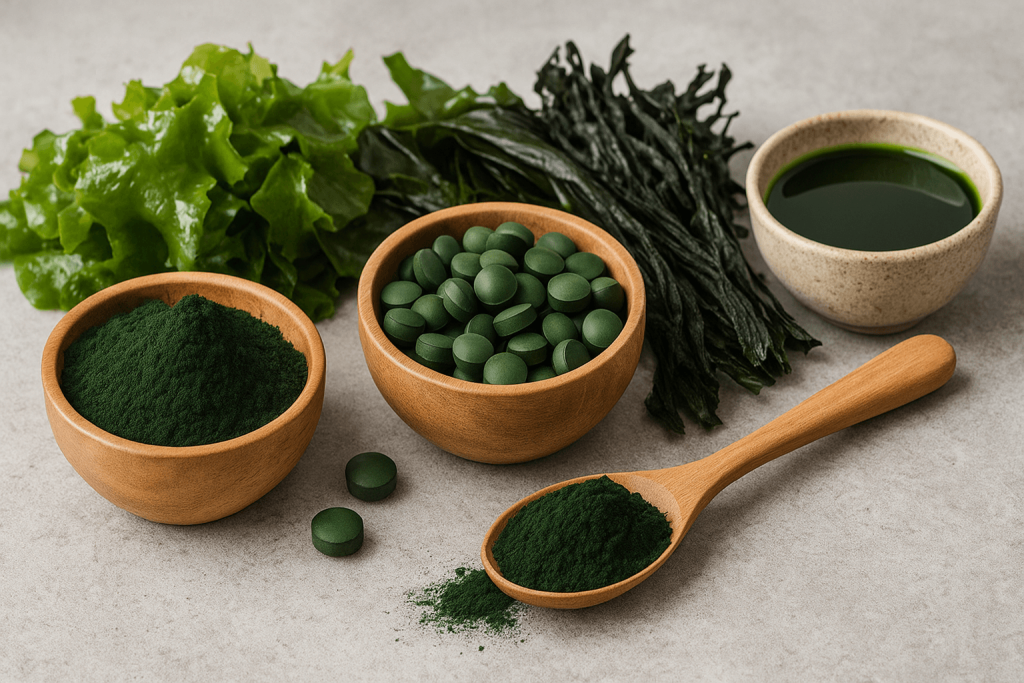The Rise of Algae: The Superfood Revolution for Energy and Immunity

In the world of wellness and nutrition, few superfoods have generated as much scientific excitement as algae. Once confined to specialty health stores, algae-based products like spirulina, chlorella, and seaweed are now taking center stage — praised for their dense nutrient profile, environmental sustainability, and powerful health benefits.
Whether you’re looking to boost energy, support immunity, or embrace plant-based nutrition, algae is one of the most efficient, sustainable superfoods available today.
Why Algae Is the Future of Nutrition
Algae — microscopic or sea-grown plant-like organisms — are nutritional powerhouses. These simple organisms thrive with minimal resources, making them one of the most sustainable food sources on the planet.
Nutritional Benefits of Algae:
✔ Complete plant-based protein source
✔ Rich in essential vitamins and minerals (B12, iron, magnesium)
✔ High in antioxidants and anti-inflammatory compounds
✔ Packed with chlorophyll for detoxification
✔ Natural source of omega-3 fatty acids
✔ Supports immune function and energy production
In fact, NASA has recognized algae like spirulina as a potential food for space missions due to its nutrient density.
Top Algae Superfoods and Their Benefits
1. Spirulina
A blue-green microalgae known for:
- Complete protein profile (up to 70% protein by weight)
- High levels of B vitamins, iron, and chlorophyll
- Antioxidant support to combat oxidative stress
- Boosting endurance and energy naturally
2. Chlorella
A green algae celebrated for:
- Detoxifying heavy metals from the body
- Supporting immune health
- High chlorophyll content for cleansing and oxygenation
- Rich in vitamins, minerals, and fiber
3. Seaweed (Nori, Dulse, Wakame, Kelp)
Culinary-friendly, sea-grown algae:
- Excellent source of iodine for thyroid health
- Contains fucoxanthin, a compound linked to fat metabolism
- Rich in antioxidants and trace minerals
- Supports gut health and digestion
Algae for Energy and Immunity
Energy:
The high-quality plant proteins, iron, and B vitamins in algae promote red blood cell production and oxygen transport, supporting natural, sustained energy levels without the crash of stimulants.
Immunity:
Algae are rich in compounds like phycocyanin and beta-glucans, shown to modulate the immune response, reduce inflammation, and protect against pathogens.
Sustainability: Why Algae Is a Climate-Friendly Superfood
Algae require:
✔ Minimal land and water resources
✔ No pesticides or fertilizers
✔ High carbon dioxide absorption
✔ Rapid growth with minimal environmental impact
Choosing algae-based foods reduces your carbon footprint while supporting your health — a win for both your body and the planet.
How to Add Algae to Your Daily Routine
- Spirulina or chlorella powder in smoothies or juices
- Algae-based tablets or capsules for convenient supplementation
- Seaweed snacks or wraps for iodine and mineral boost
- Algae oil omega-3 supplements as a sustainable fish oil alternative
- Incorporating seaweed into soups, salads, or rice bowls
Conclusion: Algae, the Small but Mighty Superfood
Algae may be microscopic, but its impact on nutrition, energy, and sustainability is enormous. As the world seeks cleaner, more efficient food sources, algae stands out as a solution that nourishes your body and protects the planet.
It’s time to embrace this supercharged green food and experience the benefits of algae for energy, immunity, and long-term vitality.




